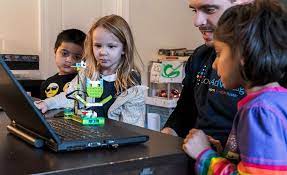
Introduction to Early Coding Education
The debate over the best time to introduce children to coding is shaped by the rapid advancement of technology and the increasing importance of digital literacy. While some advocate for introducing coding to children as young as three or four, emphasizing their high capacity for absorption, others recommend waiting until basic foundational skills such as reading, writing, and math are established. This approach helps prevent burnout and ensures that children are developmentally ready to handle more complex subjects like coding.
Cognitive Development and Coding
Understanding the cognitive development stages outlined by Jean Piaget is crucial to determining the best age for children to start learning coding. Piaget identifies several stages:
- Sensorimotor Stage (birth to 2 years): Learning through senses and motor actions.
- Preoperational Stage (2 to 7 years): Development of language and symbolic thinking.
- Concrete Operational Stage (7 to 12 years): Emergence of logical thinking and mental operations, crucial for coding.
- Formal Operational Stage (12 years and older): Ability for abstract thinking and reasoning.
Given these stages, the concrete operational stage, where children develop the ability to think logically and perform mental operations, is optimal for beginning to learn coding.
Strategies for Effective Coding Instruction
Choosing the right programming language and teaching method can significantly influence a child's coding education:
- Programming Languages: Scratch is recommended for younger children due to its visual and intuitive nature. Python, known for its simplicity and wide use, is suitable for older children. Java and C++ are better suited for those who are more advanced.
- Interactive Learning Environments: Platforms like AuKidCode.com offer interactive and fun courses designed for kids. Scratch allows children to create their own projects, enhancing learning through creativity.
- Healthy Learning Schedule: It's crucial to start with short coding sessions and gradually extend them. Regular breaks and physical activities are important to prevent fatigue and maintain interest.
Conclusion
The best time to start learning coding is during the concrete operational stage, around ages 7 to 12, when children are most capable of logical thought necessary for coding. However, individual readiness and interest should guide the decision, ensuring that children are motivated and engaged in their learning process. Proper strategies and tools can make coding a rewarding and enriching experience, laying a solid foundation for future learning and career opportunities.


Brady S
CEO and Lead Instructor for AU Kid Code. Previously, Google CA Mid-Level Software Engineer